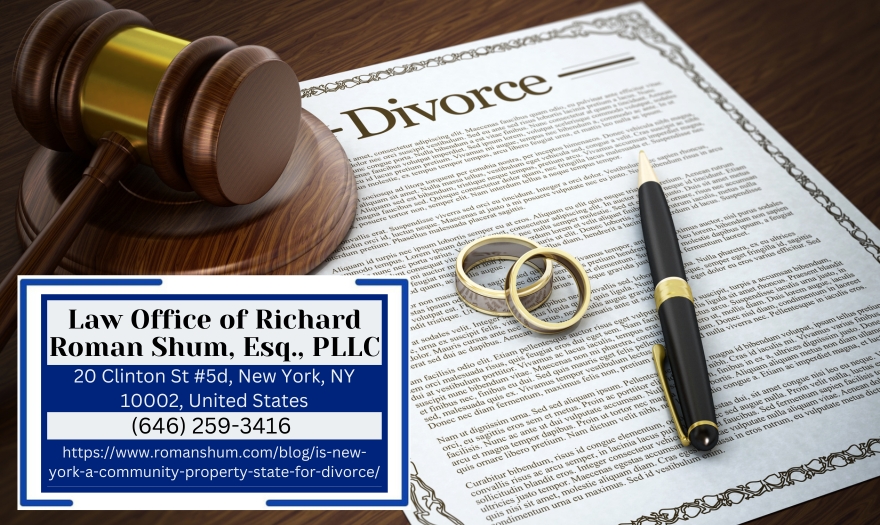Navigating divorce in New York can be daunting, especially when it comes to the division of marital property. In a recent article titled “Is New York a Community Property State for Divorce?”, Manhattan divorce lawyer Richard Roman Shum (https://www.romanshum.com/blog/is-new-york-a-community-property-state-for-divorce/) outlines how New York law approaches asset and debt division. Unlike states that operate under community property rules, New York follows equitable distribution, which aims to divide property fairly rather than equally. The article by Richard Roman Shum, of the Law Office of Richard Roman Shum, Esq., sheds light on how this system impacts divorcing couples.
For a Manhattan divorce lawyer like Richard Roman Shum, understanding and applying the principle of equitable distribution is critical in protecting a client’s financial interests. The article emphasizes that equitable distribution allows courts to consider various factors, including the length of the marriage, the income and future earning potential of each spouse, and contributions made during the marriage. “New York now functions as an equitable distribution state, whereby the division of property in divorce proceedings is conducted with the aim of achieving fairness and justice for both parties involved,” says Shum in the article.
The role of a Manhattan divorce lawyer becomes especially important in cases involving commingled assets, where previously separate property has been merged with marital property. In these situations, Richard Roman Shum explains, the classification of assets can shift, making them subject to division. For example, if one spouse receives an inheritance but then deposits those funds into a joint account used for household expenses, that inheritance may no longer be protected as separate property. Similarly, improvements made to a home owned by one spouse prior to marriage could lead to the increased value of the home being treated as a shared asset.
Richard Roman Shum’s article offers a clear explanation of New York’s equitable distribution law, contrasting it with the community property model used in states like California and Texas. He points out that under equitable distribution, courts aim to reach outcomes that reflect fairness based on each spouse’s circumstances. Factors such as age, health, and contributions to a spouse’s career or household responsibilities are considered when the court makes a final decision on asset division. According to Shum, the legal discretion provided under equitable distribution allows judges to craft settlements that meet the needs of both parties, particularly in long-term marriages or those involving children.
The article also discusses the division of marital debts, which is subject to the same equitable standards. Only debts incurred during the marriage for marital purposes are typically shared, while personal debts remain the responsibility of the individual. Richard Roman Shum highlights that the courts consider each spouse’s financial input and their ability to manage debt post-divorce when determining how liabilities should be divided.
Richard Roman Shum also references key case law that shapes the practice of divorce in New York. In Grunfeld v. Grunfeld, the court reaffirmed that equitable does not mean equal, but rather what is reasonable under the specific circumstances. Another important decision, Majauskas v. Majauskas, established that pension benefits earned during the marriage are marital property and should be shared upon divorce. These precedents, according to Shum, provide essential guidance for courts and lawyers alike.
Tax implications and the valuation of non-liquid assets like businesses or retirement accounts further complicate divorce proceedings in New York. Richard Roman Shum explains that when physical division of property is not possible, the court may order a distributive award—a monetary payment that helps balance the value of property between spouses. This approach provides flexibility while upholding the fairness central to equitable distribution.
The legal framework for dividing property during divorce in New York is governed by the Domestic Relations Law, specifically Section 236(B)(5)(d). This statute outlines the process by which marital property is divided and defines what constitutes separate versus marital property. According to Richard Roman Shum, courts are given significant discretion under this law to weigh all relevant circumstances and reach a fair outcome for both parties.
Whether dealing with a high-asset divorce or a case involving substantial commingled property, the guidance of an experienced legal representative can help safeguard a client’s financial future. At the Law Office of Richard Roman Shum, Esq., the goal is to support individuals through the divorce process with attention to New York’s equitable distribution standards. The firm advocates for fair outcomes that reflect the realities of each marriage and separation.
Understanding the legal landscape surrounding property division in a New York divorce is crucial. Richard Roman Shum’s insights into equitable distribution serve as a valuable resource for those facing this life transition. For individuals in Manhattan considering divorce, gaining clarity on how marital assets and debts are evaluated can be an essential step toward protecting long-term financial stability.
About the Law Office of Richard Roman Shum, Esq.:
The Law Office of Richard Roman Shum, Esq. is a family law practice based in Manhattan. Led by Richard Roman Shum, the firm provides legal services in divorce and related matters, focusing on helping clients navigate the legal system and pursue fair outcomes under New York law.
Embeds:
Youtube Video: https://www.youtube.com/watch?v=wgmhkU5YisI
GMB: https://www.google.com/maps?cid=3597344583150276913
Email and website
Email: richard@romanshum.com
Website: https://www.romanshum.com/
Media Contact
Company Name: Law Office of Richard Roman Shum, Esq PLLC
Contact Person: Richard Roman Shum
Email: Send Email
Phone: (646) 259-3416
Address:20 Clinton St #5d
City: New York
State: New York 10002
Country: United States
Website: https://www.romanshum.com/





